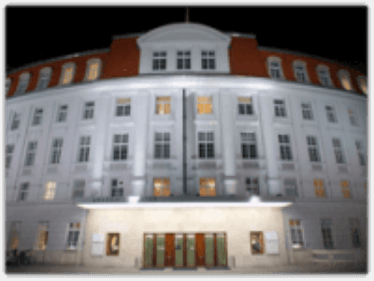Katharsis - Schedule, Program & Tickets
Katharsis
We know that he was born around 1721, that he was taken from his homeland in West Africa and sold into slavery. He came by ship from Africa to Sicily, where an Italian Marchesa took him into her care. We know that against all odds he achieved an extremely influential position at the court in Vienna after saving the life of Prince Lobkowitz on a Hungarian battlefield. He was offered his own battalion, which he declined because he was not a fighting man but a loving man. And we know he risked everything to marry the woman he loved." (from KATHARSIS)
This man's name was Mmadi Make, better known today as Angelo Soliman. What is less known: He had a daughter. In her fragmentary novel UNRAST, Olga Tokarczuk, winner of the Nobel Prize in Literature, intersperses three letters, which she signs as the sender Josephine Soliman: letters of protest and resistance to the incumbent Emperor Franz II (1768-1835). Josephine was “the first documented woman from the Black Austrian community to rebel against colonial state authority” (Anouk Shad). As the daughter of “the most famous black person in Vienna in the 18th century” (Shad), she protested after the death of her father against the fact that his corpse was prepared as an exhibit for the court natural objects cabinet and subjected to the gaze of the living. Like an Antigone in the 18th century, she asks to be allowed to bury her father so that his body can be restored to dignity and the rest of the dead.
When there is no imperial answer, her request turns to anger. On the back of Enlightenment thought, which ostensibly celebrated science, research, equality, the bourgeois revolution, the theater (yes, watching itself), strictly hierarchical world divisions are made in Europe and "the systematic construct of racial theory as a subsequent rationalization of atrocities of the colonial powers” (Shad).
In their third work in the Akademietheater, the director and author duo Dead Centre, inspired by Tokarczuk's letters, together with the ensemble revolves around the void that the handling of Mmadi Makes / Angelo Soliman's body has literally torn in Austrian history, around the construction of the culturally different and the trauma that is still associated with his name - but also about the promise of another world that is suspended in his remarkable life.
Subject to change.
This man's name was Mmadi Make, better known today as Angelo Soliman. What is less known: He had a daughter. In her fragmentary novel UNRAST, Olga Tokarczuk, winner of the Nobel Prize in Literature, intersperses three letters, which she signs as the sender Josephine Soliman: letters of protest and resistance to the incumbent Emperor Franz II (1768-1835). Josephine was “the first documented woman from the Black Austrian community to rebel against colonial state authority” (Anouk Shad). As the daughter of “the most famous black person in Vienna in the 18th century” (Shad), she protested after the death of her father against the fact that his corpse was prepared as an exhibit for the court natural objects cabinet and subjected to the gaze of the living. Like an Antigone in the 18th century, she asks to be allowed to bury her father so that his body can be restored to dignity and the rest of the dead.
When there is no imperial answer, her request turns to anger. On the back of Enlightenment thought, which ostensibly celebrated science, research, equality, the bourgeois revolution, the theater (yes, watching itself), strictly hierarchical world divisions are made in Europe and "the systematic construct of racial theory as a subsequent rationalization of atrocities of the colonial powers” (Shad).
In their third work in the Akademietheater, the director and author duo Dead Centre, inspired by Tokarczuk's letters, together with the ensemble revolves around the void that the handling of Mmadi Makes / Angelo Soliman's body has literally torn in Austrian history, around the construction of the culturally different and the trauma that is still associated with his name - but also about the promise of another world that is suspended in his remarkable life.
Subject to change.
There are no products matching the selection.


